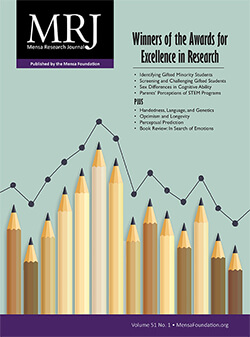Inside the Winter 2020 Mensa Research Journal
- Feb 4, 2020
- Marie Mayer, Interim MRJ Editor

In this issue, we have a smorgasbord of articles for you. First up are the articles that recently received one of the Mensa Foundation’s Awards for Excellence in Research — three from senior researchers and one submitted by a junior researcher.
We begin with two papers that explore the under-representation of students from low-income and minority groups. Why, as many programs seek diversity, is this a persistent problem?
The first article explores potential explanations as well as methods that might mitigate the inequity. I was particularly intrigued by the researchers’ perspective regarding “the purpose of identification, the development of talent, and how academic excellence can be fostered while simultaneously increasing equity in gifted education.”
In the second article, the authors discuss two aspects of the matter—how giftedness for identification purposes is viewed and how to provide appropriate services for students. They also present potential solutions to improve the diversity of students represented in gifted programs. A discussion of the Schoolwide Enrichment Model (SEM), including an example of its implementation in a school, examines how the model’s flexibility contributes to not only participation but also development of talent.
Our third research article takes a longitudinal approach to the age-old question of whether males are better than females at math, as well as whether females excel more in verbal abilities. What might their findings on cognitive ability levels and patterns mean for representation in a particular career?
The final award-winning article, submitted by a junior investigator, takes a look at younger gifted kids. Little research is done on gifted students who are in kindergarten or pre-K programs. In this study, students in those groups participate in a short-term, STEM enrichment program. Parents then responded to questions designed to analyze the students’ reactions to the program and their learning. The results are intriguing … check them out.
After reading an article from BBC News on left-handed DNA and how it can change brain structure, I wanted to know more. So, I tracked down the research article cited from Brain that is included in this issue.
Want to achieve a longer life span? Read the article on how nonbiological factors play a role in exceptional longevity. Optimistic people are less likely to suffer from chronic disease. These researchers claim optimism can also help you live longer. That seems worth smiling about.
In our complicated world today, we process a huge quantity of data and information using our senses to, well, make sense of it. What we perceive is affected by many factors and, usually, we rapidly process the inputs and react accordingly. A new brain stimulation study, reviewed in our final piece, gives us some insights into the role of our sensory brain regions.
“Poirot,” I said. “I have been thinking.”
“An admirable exercise my friend. Continue it.”
— Agatha Christie, Peril at End House
* * *
Published three times yearly, the Mensa Research Journal highlights scholarly articles and recent research related to intelligence from a diverse selection of nationally and internationally esteemed authors. Learn more about the MRJ and subscribe today.
Featured Research
- “Equity and Excellence: Proactive Efforts in the Identification of Underrepresented Students for Gifted and Talented Services,” by Scott J. Peters and Kenneth G. Engerrand (Gifted Child Quarterly)
- “Common Sense About the Under-Representation Issue: A School-Wide Approach to Increase Participation of Diverse Students in Programs That Develop Talents and Gifted Behaviours in Young People,” by Joseph S. Renzulli and Laurel E. Brandon (International Journal for Talent Development and Creativity, Vol.5, Issue 2)
- “Sex Differences in Ability Tilt in the Right Tail of Cognitive Abilities: A 35-Year Examination,” by Jonathan Wai, Jaret Hodges, and Matthew C. Makel (Intelligence, Vol. 67)
- “Parental Perceptions of STEM Enrichment for Young Children,” by Juliana Tay, Alissa Salazar, and Hyeseong Lee (Journal for the Education of the Gifted, Vol. 41, Issue 1)
- “Handedness, Language Areas, and Neuropsychiatric Diseases: Insights from Brain Imaging and Genetics,” by Akira Wiberg, Michael Ng, Yasser Al Omran, Fidel Alfaro-Almagro, Paul McCarthy, Jonathan Marchini, David L. Bennett, Stephen Smith, Gwenaëlle Douaud, and Dominic Furniss (Brain, Vol. 142, Issue 10)
- “Optimism Is Associated With Exceptional Longevity in Two Epidemiologic Cohorts of Men and Women,” by Lewina O. Lee, Peter James, Emily S. Zevon, Eric S. Kim, Claudia Trudel-Fitzgerald, Avron Spiro III, Francine Grodstein, and Laura D. Kubzansky (PNAS, Vol. 116, Issue 37)
- “Perceptual Prediction: Rapidly Making Sense of a Noisy World,” by Clare Press and Daniel Yon (Current Biology, Vol. 29)